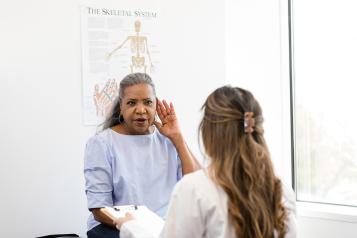Long Covid: Questions and Answers

This resource comes from our 5 May online event and presents information available about Long Covid at that time. We have also published information on the symptoms of Long Covid and support available in the North Central London area.
Visit the North Central London NHS website for the latest information on COVID-19.
Are particular communities more vulnerable to Long Covid?
It’s still too early to know. We’re also not seeing a completely representative group in the UCLH clinic, but after White British, South Asians are the next largest group.
Does having the vaccine help people with Long Covid?
It’s a mixed story. Some say they have an improvement in their symptoms but others say they feel worse. That’s more common. Neither response appears to be long lasting. It’s still really important to get the vaccine as having Covid once doesn’t necessarily protect you from reinfection.
If you have a preexisting condition such as asthma are you more likely to have Long Covid?
With asthma yes that’s perhaps possible. 14% of our patients have asthma. However it’s not true of all conditions. COPD (Chronic Obstructive Pulmonary Disease) for example is not associated with Long Covid. Many people who are young and fit get Long Covid. We also need to check that patients actually have asthma because some of the breathing conditions associated with Long Covid can look similar.
Is blood testing effective for identifying Long Covid?
We don’t have any blood test or single test of any kind that can see if you have Long Covid. Clinicians will complete an assessment based on your presentation and might do different tests in combination.
Blood tests can be abnormal but many are normal. No two patients are the same. The illness expresses itself differently in each patient.
How much is known about the neurological impact of Long Covid and the impact of good sleep/disruptive sleep patterns on recovery?
Headaches, migraines, brain fog – Covid can affect nervous tissue and brain scans often don’t pick up the abnormalities. We don’t have treatments but we can give advice to help you manage these conditions.
Can you have Long Covid if you were asymptomatic?
Yes, we have people with no clear memory of having Covid. It’s really important in these cases to look for other causes, but often we end up coming back to Long Covid.
I have ME (chronic fatigue syndrome) and now have a diagnosis of Long Covid. I’ve spoken to my doctor but haven’t been referred anywhere.
ME may increase the risk of Long Covid. You should be assessed and referred the same as anyone else. Sometimes we find that patients with ME are already following the right advice because the advice for managing Long Covid is very similar.
What about the Covid vaccine? As an ME sufferer, I was told I couldn’t have the regular flu vaccine as I could end up in a wheelchair.
It has to be your own decision. Antibodies from Covid infection don’t necessarily last a long time so you could be at risk of getting reinfected which does occasionally happen. We recommend the vaccine but it’s a personal choice.
What about waiting times for a Long Covid assessment? Are these being monitored?
We are still learning about the condition and ensuring the funding is right to meet needs. We anticipate that the NCL (North Central London) pathway is improving all the time. We want every patient to be assessed within 6 weeks but that is difficult. Waiting times are 8 weeks currently. Waiting times for community services such as physiotherapy and occupational therapy can also be longer than we would sometimes want. We were already short of these specialists even before Covid.
Monitoring waiting times will be very important to work out our resourcing needs.
We also think a lot of people being referred to the specialist clinic could be better supported in the community. We need to resource those community teams so people can be seen a bit more quickly and closer to home. We’re still redeploying staff who went away to help fight the pandemic so those community teams are getting bigger.
We’re closely monitoring waiting times and looking at the numbers regularly.
What about alternative treatments? Are these being assessed?
A few patients who have tried acupuncture have said that it’s been useful. I’ve seen that wherever I’ve worked. Most doctors are not trained in acupuncture and we don’t have a way to prescribe this but it may be available through the voluntary sector.
If you have a suppressed immune system does that mitigate Long Covid symptoms?
(This question refers to the fact that sometimes the immune system can overreact to invaders and this can cause problems)
This might help for some aspects, but not necessarily and this is a complicated question to answer.
A client I’m supporting has suffered with symptoms of Long Covid after her first vaccination. She doesn’t want the second vaccination. I know she should speak to her GP but is this a common reaction and is there an option for her to have something else?
This is a rare story, but it sounds like a Long Covid response. She needs an assessment and it will be important to see if something else could be behind this. She should get in touch with her GP and ask for advice.
What about Long Covid causing dysfunction of the Autonomic Nervous System?
Further tests usually demonstrate that the autonomic nervous system still works. It’s not broken but sometimes with Long Covid it doesn’t balance itself in the right way.
Long Covid affecting the autonomic nervous system was a surprise, something we weren’t expecting to see. Some patients get increased heart rate when they stand up and they can also get dizziness.
We usually advise staying well hydrated and maintaining adequate salt intake as this can help the symptoms.
Many of the women I support are suffering from Long Covid. In particular, they have aching muscles and brain fog. However, when they go to the GP their symptoms are not being recognized. GPs need to understand that this condition is real. We also need to give residents the information they need to help them understand. What do you do if you think your GP is missing something?
I agree. There is also lots of Long Covid in my community.
How can I get diagnosed by my doctor? I’ve had Covid then a bad reaction to the jab. My blood tests come back normal so how do I push that further? Do I say 'What about these tests?' Does he even know about them?
There is no test as such. It’s always a clinical opinion. What we are trying to do is create a template assessment, a set number of tests and questions that are useful. This has been rolled out to every practice in the NCL area so all GPs should be able to access this. It is a new syndrome so there are challenges.
If you feel that something has been missed you should go back to your doctor (in the normal way you would). Perhaps advocacy support could be available for this.
Not all practices are referring for Long Covid so we are aware there is a knowledge gap.
How can you combat the asymptomatic spread of Covid?
Asymptomatic Covid infection is different from Long Covid. Long Covid is symptomatic. People with asymptomatic infection don’t have Long Covid (though it may be possible that they go on to develop it at some point – see earlier question)
Are you doing interventions with medication? What is working?
We are occasionally using medication for chest pain. But we take that decision patient by patient. For autonomic symptoms, we are telling people to stay hydrated and manage salt intake but occasionally we start medicines to control the heart rate.
We are using anticoagulants for people with clots. Antihistamines are also proving effective for some patients (helpful for some but not others). Trials are needed.


